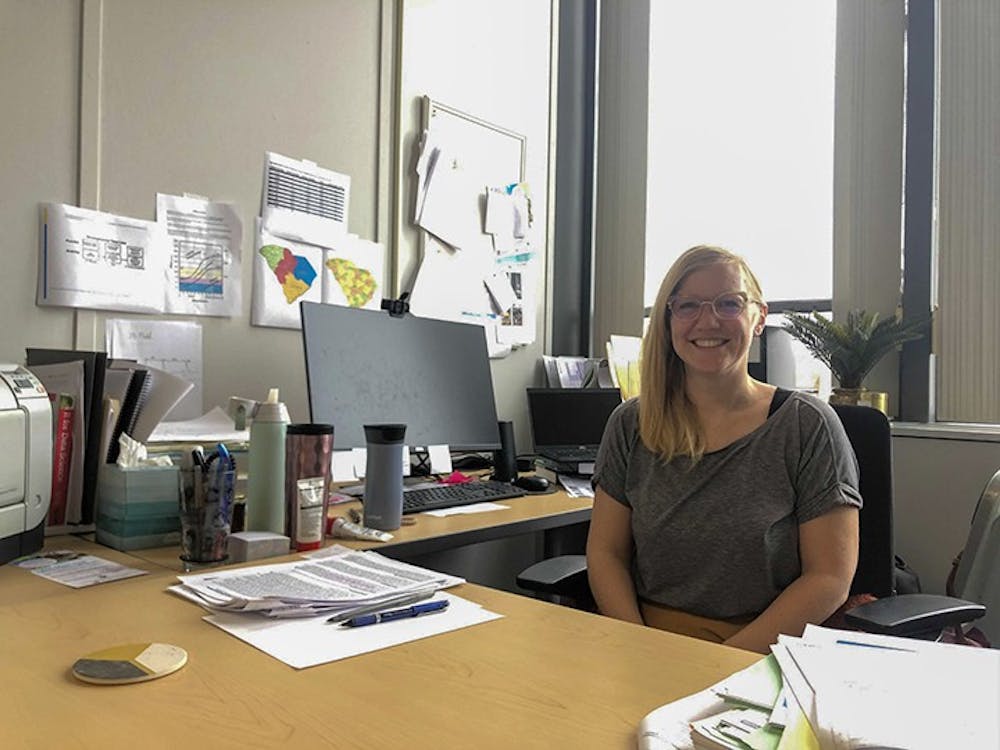Jessica Bradshaw still remembers one of her first patients: a 14-year-old autistic boy with a mop of red hair. During her undergraduate studies, her job was to pick up the minimally verbal, high-needs boy from school, spend time with him and take care of him at his house.
Today he is 30. When Bradshaw last checked on him several years ago, he still needed significant support and lived in a group home for autistic adults.
“I think about him all the time,” Bradshaw said. “What would have happened if we — if he was diagnosed at 12 months, for example, or even what I’m trying to do — to diagnose someone like him at three months, how might his developmental trajectory been different?”
Bradshaw now conducts research to answer this very question.
As the director of the Early Social Development Lab, which is a part of the Institute for the Mind and Brain at USC, Bradshaw studies infants with autistic siblings from birth to 2 years old, looking for bio-behavioral markers of autism.
Some of these markers include attention and movement. Bradshaw and her team use heart rate monitors and eye-tracking technology to monitor these factors as their patients watch interactions on a screen and interact with people and objects in person. Once the lab identifies these markers in infants, it can create supportive environments for them while their “brain plasticity is at its peak,” according to Bradshaw.
“There’s no, you know, preventing autism or curing autism, and that’s not what I’m interested in,” Bradshaw said. “But what I am interested in is teaching or helping families of children with autism support their child in reaching their potential.”
Bradshaw said she started working in autism research during her undergraduate years at the University of California, San Diego, and hasn’t been “outside of an autism lab” since.
“That spectrum, and that no individual with autism experiences the world in the same way or looks the same, is really interesting to me,” Bradshaw said.
Bradshaw received her PhD in clinical, counseling and school psychology from the University of California, Santa Barbara and completed her postdoctoral fellowship at Emory University in Atlanta. In Fall 2018, she accepted her current position as a researcher and assistant professor at USC.
She currently teaches PSYC 420: Survey of Developmental Psychology to undergraduates twice a week. Bradshaw – known as Jessie to the lab team – said while she prefers research, she also enjoys mentoring the students both in her classes and the lab.
One of these students, Vincent Ylagen, said he was surprised when he met the young, “laid-back” Bradshaw in his second year at USC because he’d imagined all professors to be “super high-strung, super formal” and older.
The fourth-year psychology student said the lab director has taught him many things in the past two years. Among those is how “to work hard and to play hard” at the same time.
“She kind of emphasizes not to, I guess, take ourselves too seriously but also have fun while doing what we do,” Ylagen said.
Though the team has fun, the lab is still bustling with work. At the helm of the operation, Bradshaw moves from task to task, and yet, she still makes time for others.
“She makes time for like just about everyone, which means she has, like, no time for herself,” said Emma Platt, one of the two research coordinators for the lab.
Bradshaw said the lab is still in the stages of recruiting and studying participants, a long process of measuring and gathering data over time. The next phase, which is still far away, will include analysis of that data.
Bradshaw has seen a greater awareness of autism in recent years, which she said has been “one of the driving factors” in the 10% increase in nationwide autism prevalence since 2014. Along with increased awareness, Bradshaw has also seen more recognition of the autistic community because of the neurodiversity movement. This movement aims to increase understanding and social acceptance of individuals with cognitive and neurological differences.
Bradshaw said she hopes the university can help further this progress.
“It would be great to have, you know, the community see USC as a resource for families with autism,” Bradshaw said. “This is kind of a service, and we’re here to support.”

